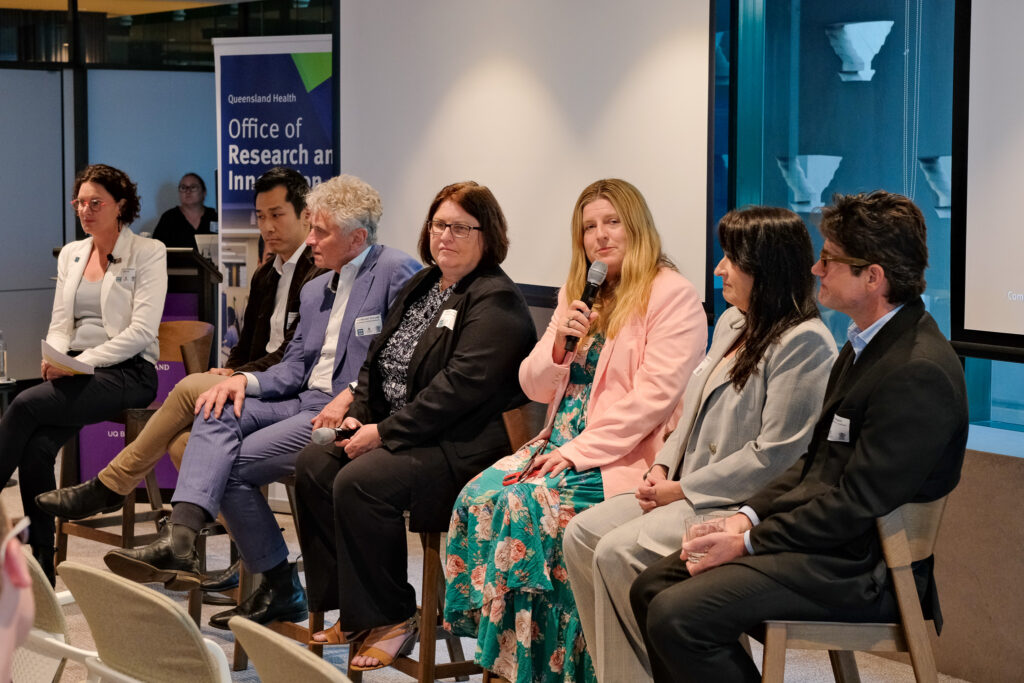Queensland is doing a great job fostering health innovation, but it needs to increase speed to commercialisation and develop a culture where research is ‘business as usual’.
These were two key points raised by the panel of industry, government, and university representatives as part of The Great Innovation Debate at the joint ARM Hub and Queensland Health Innovation Frontier Forum on Monday.
Our panellists were invited to comment on gaps existing in the health innovation ecosystem that could be addressed by policy makers.
With the translation of research to market taking between 15 and 25 years, it is important to pick-up the pace of commercialisation – not only to realise patient outcomes sooner but to continue to attract investment.
It is also essential to encourage hospitals and clinicians to realise the value of research and partner with universities.
‘Team Queensland’ is working
The Great Innovation Debate covered two topics:
-
Who is best positioned to foster health innovation in Queensland? Is it industry, universities, or hospitals?
-
Who holds the key to data sovereignty? Is it the universities, hospitals, industry, or individuals?
The panel was unanimous in their belief that collaboration was essential: “It is a team sport. We need the universities to bring funding, clinicians to articulate what is required, and industry to scale it”.
‘Team Queensland’ has led to international recognition of the local innovation ecosystem: “People want to come to Queensland because of how well industry, academia, and government – Team Queensland – operates. You just don’t see that in other places”.
‘Team Queensland’ is an approach across universities and the Queensland Government to support multidisciplinary collaboration and strong industry partnerships to deliver leading research outcomes and accelerate the development and commercialisation of ideas.
Protecting people’s data
Patient consent drives accessibility, with data falling into two main categories: explicit consent (data is free for generalised use), and consent with a waiver (restricted use).
In clinical trials, the chief investigator owns the data and the boundaries governing the use of the data hinges on patient consent. As such, protecting patient data is a top priority.
When questioned about the steps industry should take in accessing patient information, the panellists all pointed to synthetic datasets: “Synthetic datasets can be your first step rather than going to hospitals”.
Synthetic data, or artificial data, provides a realistic representation of the original data source; it looks like the original data source without containing any information on any real individuals.
There is intense scrutiny around the use and protection of patient data. While research shows that 80% of people are happy to share data if it is for the public good, the remaining 20% are strongly opposed to its generalised use: “Queensland has lots of high-quality data but there is great responsibly in having those assets”.
Industry showcase
The Great Innovation Debate highlighted the value of industry. Our forum attendees heard from six block-buster Queensland biomedical on track to revolutionise the sector.
Microbio technology can test for sepsis 24 hours faster than the current gold standard. This ensures life-saving treatment can be delivered faster and significantly reduces healthcare costs.
Propel Health AI has developed an end-to-end healthcare data platform.
The new clinical waste solution by HygiFix can result in a 93% reduction in emissions.
Clinials is using artificial intelligence to improve the efficiency of clinical trials.
Technology developed by Coritical Dynamics monitors a patient’s brain while under general anaesthetic to ensure safer and more efficient surgeries.
Innovative Rehab Technologies says the scope for ROBERT the Robot has expanded beyond neuro-rehabilitation to a therapy robot with application in helping the elderly.
Our thanks to all who participated in the event and our attendees. See you next year.





















